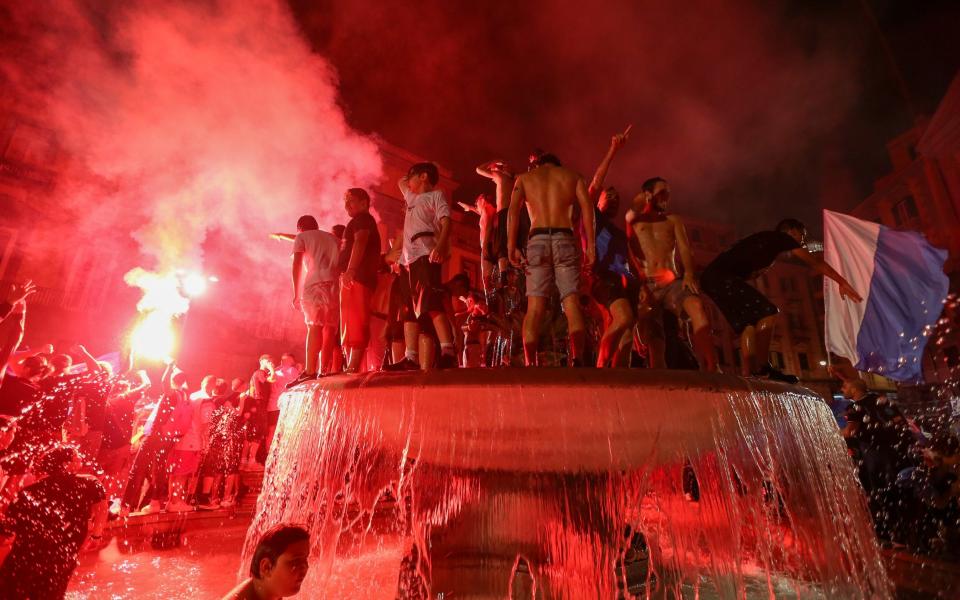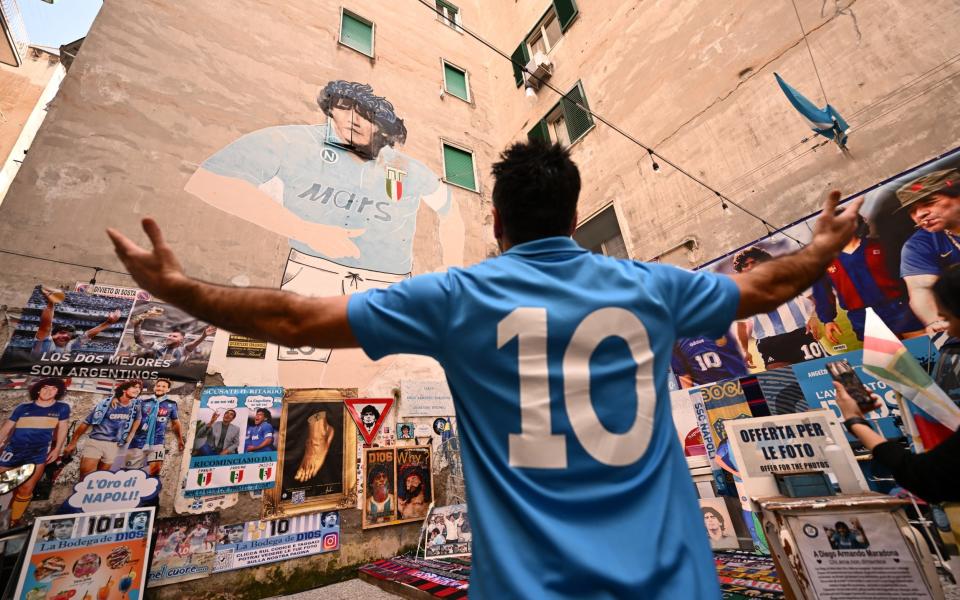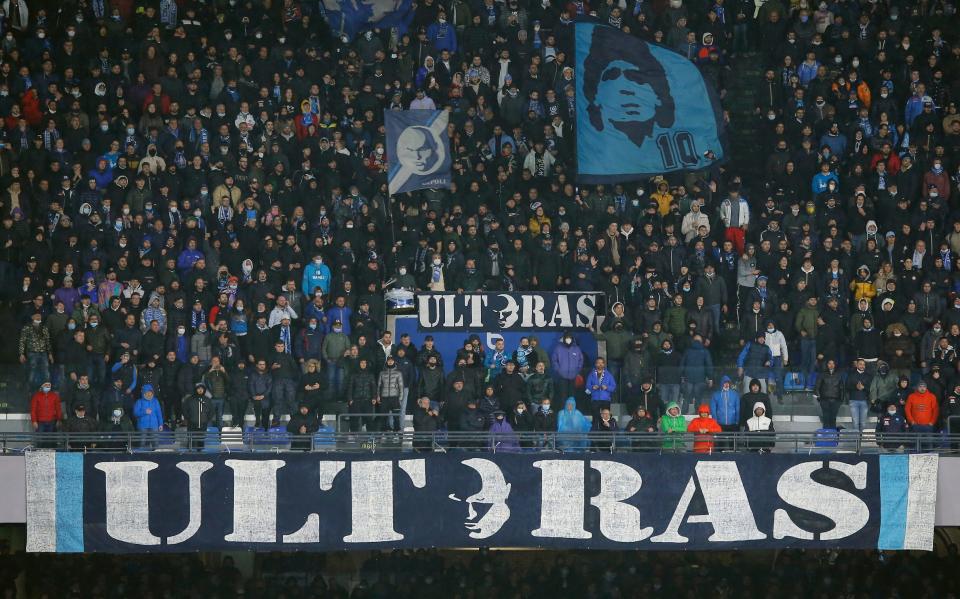The welcome England fans can expect in Naples

If you had any doubt that Naples is a football city like no other then you need only watch the opening nine minutes of Asif Kapadia’s acclaimed Diego Maradona documentary.
The year was 1984 and, with Todd Terje’s Delorean Dynamite disco mix booming in the background, Maradona is filmed being driven at breakneck speed through the twisting streets of Naples for his official unveiling as a Napoli player.
One of the most unlikely transfers in football history – from mighty Barcelona to a club 11th in Serie A – was neatly summed up by one Italian television network: “The poorest city in Italy buys the most expensive player in the world.”
The Stadio San Paolo was full to welcome this 5ft 4½in genius and, as Maradona arrived to chaotic, carnival-like scenes, the enduring Neapolitan cocktail of pride, danger and unbridled passion has rarely been more vividly displayed.
A marriage between football’s ultimate bad boy and a one-club city desperate to shatter the traditional establishment already felt perfect.
The scene was further set with the opening question to Maradona at an anarchic press conference which took place on a basketball court beneath the stadium amid baying chants outside of “Diego, Diego”.
“I would like to know if Maradona knows what the Camorra is,” asks the journalist. “And if he knows that the Camorra money is everywhere here even in football?”

Dating back to the 17th century, the Camorra is one of Italy’s oldest criminal organisations and most closely associated with the southern Campania region of which Naples is the capital.
“This question is highly offensive - it’s so insulting that I won’t answer it,” interrupted the Napoli president Corrado Ferlaino. He then got to his feet and, in front of a visibly bemused Maradona, furiously ordered the journalist out of the room. “Get out! Right now! Immediately! As Napoli's president, I expel you from the room,” he said, denying any link with the Camorra, accusing the journalist of “ignorance” and highlighting the “good work ethic” of Naples.
Almost 40 years later and the England football team, backed by around 2,500 supporters, will make the very same journey through the streets of Naples to a venue renamed Stadio Diego Armando Maradona in honour of the man locals simply call “God”, following six seasons which included two Serie A titles and the Uefa Cup. Maradona’s face, and stencils bearing the name of the Brigata Carolina (Napoli’s ultras), are still emblazoned on walls across the city.
These remain the only league and European titles in the city’s history, although that will surely change over the coming weeks as the best Napoli team since Maradona head into the Serie A finale with a 19-point buffer and a very winnable Champions League quarter-final against AC Milan.

The importance of football to Naples amid Italy’s historic north-south divide is difficult to over-emphasise. The official “Visit Naples” tourist guide says simply that “SSC Napoli is not just a football team... it’s the city’s state of mind” and England’s arrival coincides with a wave of fervour.
A return to past glories, however, has also been accompanied by the spectre of disorder, and there were shameful scenes last week ahead of the Champions League victory over Eintracht Frankfurt.
Away fans were ostensibly banned following scuffles in the first leg in Germany, but still arrived in Naples and violent clashes left a trail of destruction that included several burnt-out cars.
Italy’s deputy prime minister Matteo Salvini pointed the finger at those who travelled – “these are not fans, they are criminals, thugs, I wonder if they would make the same mess in Germany?” but Philipp Reschke, an Eintracht board member, claimed that trouble began when a group of 150 locals clashed with away supporters.
“It seemed a bit like the groups have searched and have found each other,” he told the German newspaper Bild. The eight arrests included five Napoli fans. Earlier this year, Italian police were also forced to shut down a main road between the north and south of Italy after violence involving flares, belts and bats broke out at a motorway service station in Tuscany between fans of Napoli and Roma.
Although Italian authorities had previously offered reassurances to England fans ahead of Thursday’s fixture, stressing that Napoli fans are generally far less interested in matches involving the national team, there has been a noticeably large police presence at Naples airport over recent days. The authorities have been keen to establish immediately who is arriving on flights from England to watch Thursday night's match and where they will be staying.
A total of 23 buses will be laid on to take England fans to and from the stadium, with the Football Association emphasising the Italian police advice that supporters should take up this offer.
English police will also be in Naples in an attempt to ensure that there are no problems. That is normal for away trips, but the backdrop did change on Sunday when representatives of an England supporters’ group received what they called a “sinister and threatening” message. They had been planning a friendly football match with Italian supporters this afternoon but were warned against staging the game in an email purporting to be from Napoli ultras.
The match was subsequently cancelled on the advice of the Italian authorities, even if Napoli fan groups have suggested that the message was probably a hoax.
Whatever the truth, it has contributed to what one England fan called a “cagey” atmosphere at Naples airport this week.
Italy do not have a national stadium in the same way as Wembley and, although they take the team to different Italian cities, it will be the first international match in Naples for a decade.
England have one happy past memory of an intimidating and historic stadium that staged their dramatic World Cup defeat of Cameroon at Italia ’90. But the move strongly suggests that the Italians are determined to maximise home advantage for a fixture that promises to define this Euro 2024 qualifying campaign.

 Yahoo Sport
Yahoo Sport 





































